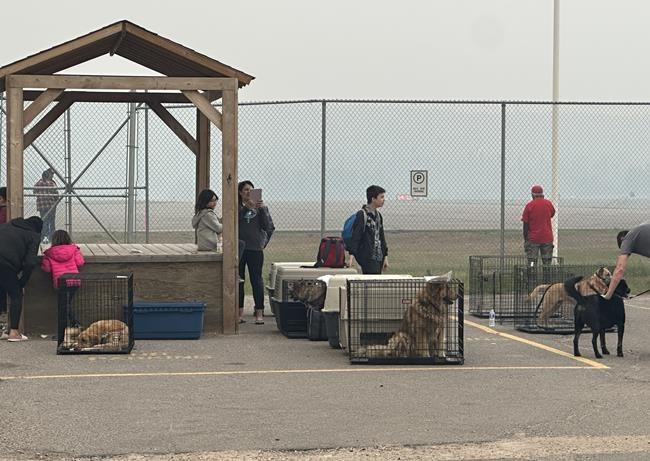
Evacuees and their pets wait at the Fort Chipewyan, Alta. airport in this handout photo. A northern Alberta hamlet was eerily quiet and peaceful Wednesday after being evacuated in the face of an out-of-control wildfire inching closer to town. THE CANADIAN PRESS/HO, Mikisew Cree First Nation *MANDATORY CREDIT*
Republished May 31, 2023 - 5:48 PM
Original Publication Date May 30, 2023 - 9:16 PM
FORT CHIPEWYAN, Alta. - A northern Alberta hamlet was eerily quiet and peaceful Wednesday after being evacuated in the face of an out-of-control wildfire inching closer to town.
"There's nobody around," said Chief Allan Adam of the Athabasca Chipewyan First Nation, whose people are among those ordered out of the remote northeastern community of Fort Chipewyan.
The sun was shining Wednesday and the skies were clear but the town was silent, he said.
"It was unreal. No sound of kids, no sound of motors. Just the essential services people. That's it."
Almost all the 800 inhabitants have left the hamlet, said Adam. With no summer road into the community, most were flown out on planes from a number of private carriers as well as an Armed Forces Hercules.
Adam said many left via the Athabasca River on boats piloted by people from the Cree and Métis community of Fort McKay, a four- to six-hour trip.
Government officials said about 630 people had been evacuated — 537 by air, 108 of those on the Hercules, and 96 by boat.
Fort McKay had been preparing for the possibility since Sunday night, when leaders planned to transfer elders by air from Fort Chipewyan to that community's long-term care centre.
"They were very thankful and grateful," said Chief Raymond Powder of the Fort McKay First Nation. "We had seven elders there, the oldest being 97."
Fort McKay was ready to assist the evacuation by Tuesday morning, said Ron Quintal, president of the Fort McKay Métis Association.
"We assembled our teams very quickly," he said. "We were ready."
More than 40 boats left Fort Chipewyan. They were monitored over the course of their journey by safety boats from Fort McKay carrying extra fuel, water and food, and met at the end by volunteers who prepared hot meals and cold drinks.
A nurse was on hand and a doctor was on call. Kennels were provided for pets.
Some of those boaters had been forced to bivouac overnight along the riverbank when smoke and darkness made travel too dangerous.
Eventually, the evacuees were bused to Fort McMurray.
Fort McKay and Fort Chipewyan are tightly linked, Quintal said.
"We share a kinship. We share a lot of family connections, a lot of friends."
Adam said there was a lot of emotion as people waited for planes out of the community.
"There was a lot of frustration, a lot of confusion. Definitely, people were scared," he said.
"They didn't know what to expect. You're leaving your home, you're leaving your community and you don't know if you're coming back."
He said the fire is about four kilometres from Fort Chipewyan's airport — half Tuesday's distance.
Josee St-Onge of Alberta Wildfire said the fire is about 10 kilometres from the community, being blown away from it to the north.
Evacuees are headed to temporary accommodations in Fort McMurray and Fort McKay. Residents were told Tuesday to be ready to leave with 15 minutes notice.
It's been tough season for the residents of Fort Chipewyan.
In February, they learned their drinking water source was downstream from two releases of oilsands wastewater. No contaminants were found at the community, but people drank bottled water for weeks.
The community also suffered a series of suicides and suicide attempts this spring.
"We've dealt with so much," said Adam. "One crisis after another."
Across Alberta, St-Onge said the province is dealing with 66 wildfires, with 18 out of control. The flames have scorched 11,000 square kilometres of forest. Firefighters continue to arrive from out of province, including 80 from Yukon and British Columbia.
St-Onge says Alberta remains under a state of emergency.
"We're still at the beginning of the fire season and there's a lot of work ahead of us."
This report by The Canadian Press was first published May 31, 2023.
— by Bob Weber in Edmonton
News from © The Canadian Press, 2023